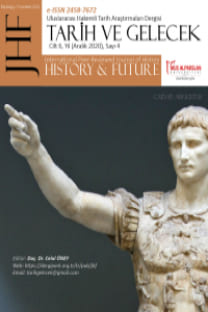Sosyal Adaletsizliğe Karşı Romantik Yazarlardan İdeal Toplum Görüşleri: Devrimin Farklı Yorumu
Thomas Paine, Edmund Burke, Helen Maria Williams, Mary Wollstonecraft, millet, haklar, özgürlük
Views of İdeal Society by Romantic Writers Against Social İnjustice: Recasting the Revolution
Thomas Paine, Edmund Burke, Helen Maria Williams, Mary Wollstonecraft, Nation, rights, freedom,
___
- Bromwich, David (1995). “Wollstonecraft as a Critic of Burke”, Political Theory, Vol. 23, No. 4, pp. 617-634.
- Burke, Edmund (2002). Reflections on the Revolution in France: A Critical Edition. Ed. J. C. D. Clark. Standford University Press.
- Furniss, Tom (1993), Edmund Burke’s Aesthetic Ideology, Cambridge, 123.
- Ingersoll, Robert G. (1915). “Life and Deeds of Thomas Paine.” Robert G. Ingersoll's 44 Complete Lectures. Chicago: Regan Publishing.
- Mallory-Kani, Amy (2015). “A Healthy State”: Mary Wollstonecraft's Medico-Politics”. The Eighteenth Century, Vol. 56, No. 1, pp. 21-40.
- Paine, Thomas (2003). Common Sense, Rights of Man, and Other Essential Signet Classics.
- ____, (1984) Rights of Man. ed. Eric Foner, Harmondsworth.
- ____, (1969) The Complete Writings of Thomas Paine. Ed. Philip S. Foner. New York: Citadel Press.
- Todd, Janet & Butler, Marilyn (1989). The Works of Mary Wollstonecraft, 7 vols. London: Pickering, 5:7-8.
- Travers, Len (1997). Celebrating the Fourth: Independence Day and Early Republic. Amherst: Univ. of Massachusetts.
- Williams, Helen Maria. Letters Written in France in the Summer of 1790. ‘On Revolution’, Letters Containing a Sketch of the Politics of France. ‘Madame Roland’.
- Wollstonecraft, Mary (2004). A Vindication of the Rights of Women. Penguin Classics.
- Yayın Aralığı: Yılda 4 Sayı
- Başlangıç: 2015
- Yayıncı: Celal ÖNEY
Sosyal Adaletsizliğe Karşı Romantik Yazarlardan İdeal Toplum Görüşleri: Devrimin Farklı Yorumu
Wittgeinstein’da Söylenemeyen Üzerine
Ortaçağda Dristian Rahiplerinin Noterler ve Hakimler Olarak Rolü
Gaziantep Savunmasının Hazırlık ve Teşkilatlanmasını Ali Cenani Bey mi Yaptı?
Kroniklerde Gambiya Hapishane Sistemi
Ousainou LOUM, Akpojevbe OMASANJUWA
Kosova’da Çağdaş Öğretimde Kültürlerarasılık
Shqipe AVDIU-KRYEZİU, Arsim AVDİU
1946 Belediye Seçimleri ve Urfa’daki Yansımaları
Dardania Tarafından Epigrafik Anıtlardan Sağlanan Doğu Topluluğunun Varlığı
XX. Yüzyılın 90'lı Yıllarında Uluslararası Güçlerin Kosova Sorununa Karşı Tutumu
